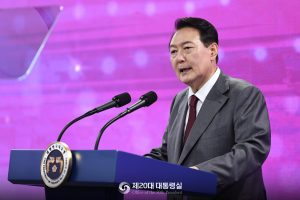In his speech to mark the 77th Liberation Day on Monday, South Korean President Yoon Suk-yeol offered Pyongyang his “audacious initiative” to support reviving its crippling economy once it takes steps toward denuclearization.
“Denuclearization of North Korea is essential for sustainable peace on the Korean Peninsula, in Northeast Asia and around the world,” Yoon said.
Avoiding Washington’s preferred term, “denuclearization of the Korean Peninsula,” Yoon again reiterated that Pyongyang is the main actor who should be responsible for the denuclearization of the peninsula.
During his speech on the date marking South Korea’s liberation from Japanese occupation, Yoon offered few details of his “audacious” economic offer for the North if it shows substantive progress toward denuclearization. He first raised the idea in his inauguration address back in May.
“The audacious initiative that I envision will significantly improve North Korea’s economy and its people’s livelihoods in stages if the North ceases the development of its nuclear program and embarks on a genuine and substantive process for denuclearization,” Yoon said on Monday.
“We will implement a large-scale food program; provide assistance for power generation, transmission and distribution infrastructure; and carry out projects to modernize ports and airports for international trade. We will also help enhance North Korea’s agricultural productivity, offer assistance to modernize hospitals and medical infrastructure, and implement international investment and financial support initiatives.”
For the past few months, the “audacious initiative,” the Yoon administration’s first approach to entice Pyongyang to return to the negotiating table, has remained vague with gray areas. During his speech Monday, Yoon revealed slightly more about this economic package with preconditions.
The initiative includes economic exchanges of North Korean resources, such as minerals and rare earths, for South Korea’s food supplies. Seoul said it will plan to kick off the inter-Korean joint economic development committee for cooperation when both countries make a comprehensive agreement on the denuclearization process.
As North Korea’s economy has plummeted due to the sanctions of the United States and the United Nations, Seoul has implied that it could coordinate with them to partially lift the sanctions if North Korea makes steps toward denuclearization. In this context, outside experts believe that Yoon may have consulted with Washington before revealing details of his “audacious initiative” on Monday.
Following up on Yoon’s address, Kim Tae-hyo, a deputy presidential national security adviser, called the audacious initiative a “bold proposal” and implied that the initiative can be implemented “in the early stage of negotiations” if North Korea shows a sincere attitude toward denuclearization.
Similar proposals toward Pyongyang had already been made by Yoon’s predecessors since the late 1990s. Progressive governments have usually offered humanitarian aid preemptively, even before Pyongyang made any moves toward denuclearization, in an attempt to rebuild and improve inter-Korean ties.
However, North Korea demonstrated that it has no interest in giving up its nuclear weapons by conducting its first nuclear test in 2006. Since then, successive South Korean conservative governments halted support to the North and beefed up defense capabilities to cope with the North’s rising nuclear and missile power. Lee Myung-bak and Park Geun-hye, two previous conservative presidents, each sought room for dialogue over Pyongyang’s nuclear programs, but failed to entice the North to dismantle its nuclear arsenals.
Now, after five years of former South Korean President Moon Jae-in’s peace process, Yoon, another conservative president, seems to be sticking with his initiative as the primary option to tackle the North’s nuclear and missile threats.
Considering leader Kim Jong Un and his powerful sister Kim Yo Jong’s recent remarks, however, Pyongyang might not even consider the initiative.
Despite Kim’s rare admission of the failure of his five-year economic plan, the North’s supreme leader still believes he can revive his country’s devastated economy. Most important, the “audacious” plan will never be carried out unless Kim publicly declares his willingness to give up his nuclear weapons – something that he has repeatedly signaled will never happen.
As of writing, North Korea’s state-controlled media has not published any response to or report on Yoon’s address. Considering Pyongyang’s responses to Seoul’s friendly gestures in the past, North Korea would either keep silent or release a harsh statement from Kim Yo Jong or other officials to justify missile tests as a response.

































